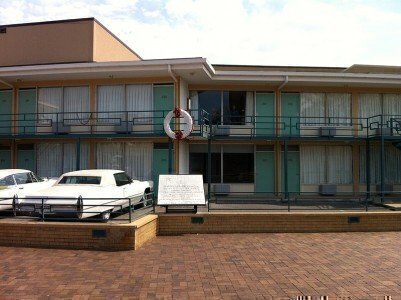It was on this day in 1968 that civil rights leader Martin Luther King Jr. was killed by an assassin’s bullet in Memphis. The world has changed greatly since 1968, but King’s message survives intact.
 On the day of his death, King was in Tennessee to help support a sanitation workers’ strike. At the age of 39, he was already an internationally known figure. Starting with the Montgomery boycott in 1955, King had led a series of nonviolent protests against discrimination.
On the day of his death, King was in Tennessee to help support a sanitation workers’ strike. At the age of 39, he was already an internationally known figure. Starting with the Montgomery boycott in 1955, King had led a series of nonviolent protests against discrimination.
in 1964, King was awarded the Nobel Peace Prize, at the time the youngest Peace Prize winner ever at the age of 35.
His acceptance speech in Norway included the famous statement, “I believe that unarmed truth and unconditional love will have the final word in reality. This is why right temporarily defeated is stronger than evil triumphant.” King also donated his prize money of $54,123 to the civil rights movement.
On April 3, 1968, King was in Memphis to support a movement seeking better compensation for black sanitation workers. He spoke at the Bishop Charles Mason Temple to a group of supporters--knowing that there were threats made against his life.
He told the audience about how he survived a 1958 assassination attempt by a mentally deranged woman named Izola Ware Curry, who stabbed King in the chest at a New York book signing.
Link: Read the Mountaintop Speech
“I want to say tonight that I, too, am happy that I didn't sneeze. Because if I had sneezed I wouldn't have been around here in 1960, when students all over the South started sitting-in at lunch counters. And I knew that as they were sitting in, they were really standing up for the best in the American dream and taking the whole nation back to those great wells of democracy, which were dug deep by the founding fathers in the Declaration of Independence and the Constitution,” he said.
The better-known part of King’s speech was its conclusion.
“I don't know what will happen now; we've got some difficult days ahead. But it really doesn't matter with me now, because I've been to the mountaintop. And I don't mind. Like anybody, I would like to live a long life--longevity has its place. But I'm not concerned about that now. I just want to do God's will. And He's allowed me to go up to the mountain. And I've looked over and I've seen the Promised Land. I may not get there with you. But I want you to know tonight, that we, as a people, will get to the Promised Land. And so I'm happy tonight; I'm not worried about anything; I'm not fearing any man. Mine eyes have seen the glory of the coming of the Lord,” King concluded.
At 6:05 P.M. on Thursday, April 4, 1968, King was shot while standing on a balcony outside his second-floor room at the Lorraine Motel. One shot was heard coming from another location. King was rushed to a hospital and died an hour later.
A young colleague, Jesse Jackson, had been below King’s balcony speaking with him when the civil rights leader was shot.
Senator Robert Kennedy was at a campaign rally when he learned of King’s death.
“What we need in the United States is not division; what we need in the United States is not hatred; what we need in the United States is not violence or lawlessness; but love and wisdom, and compassion toward one another, and a feeling of justice toward those who still suffer within our country, whether they be white or they be black,” Kennedy said.
As word spread of King’s death, protests started nationwide that included outbreaks of violence, resulting in more than 40 deaths. President Lyndon Johnson ordered a national day of mourning on April 7. Two days later, King’s funeral in Atlanta had more than 100,000 mourners.
In July 1968, a fugitive, James Earl Ray, was extradited from Great Britain to stand trial for the killing. Ray agreed to a controversial plea bargain, and he was sentenced to 99 years in prison, where he died in 1998.
Ray later recanted his confession, and members of King’s family supported reopening an investigation into the shooting.
At the time of his death, King was trying to organize a protest in Washington against poverty, and he had become outspoken as an opponent of the Vietnam War.
A year earlier, King told an audience on April 4, 1967, at a New York City church that he was against the war overseas.
“We were taking the black young men who had been crippled by our society and sending them 8,000 miles away to guarantee liberties in Southeast Asia which they had not found in southwest Georgia and East Harlem,” he said.






